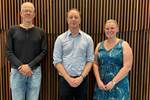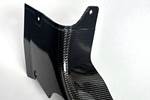ILAuNCH explores 100% bio-epoxy resin suitability for space
Three partner universities in Australia aim to mature research for Change Climate’s Byoxy bio-epoxy resin formulation, relying on environmental simulation testing and structural composites expertise.
In the latest Innovative Launch, Automation, Novel Materials, Communications and Hypersonics (iLAuNCH) project, three of its partner universities — the University of Southern Queensland (UniSQ), the Australian National University and the University of South Australia — are working with green innovation company Change Climate Pty Ltd/Byoxy (Adelaide, Australia) to explore the suitability of a bio-epoxy resin for the manufacture of sustainable and highly durable composites for aerospace applications.
Epoxy resins are a mainstay of modern airspace manufacturing and have been for the better part of several decades. These materials are combined with carbon, Kevlar and fiberglass to create structural composites in aerospace and space applications. But although current epoxy resin-reinforced composites show high-strength and low-weight properties needed in the extreme environments of space, they can also degrade very rapidly with constant exposure to ultraviolet (UV) radiation.
“The novel bio-epoxy formulation being investigated in this project has a characteristic of being insensitive to UV radiation, which could open up their applicability in aerospace and space environments,” says iLAuNCH chief technology officer, Dr Joni Sytsma. “As the UV radiation environment of space is so severe, current epoxy resins do not survive even months. So if this material is indeed superior to traditional petrochemical-based epoxy formulations, then it could open up new avenues for space hardware manufacturing in Australia.”
UniSQ’s Dr. Allan Manalo, professor in civil engineering, will lead the project from Toowoomba, working with Future Industries Institute, University of South Australia professor Colin Hall, and Eduardo Trifoni, head of the National Space Test Facility National Space Test Facility, Australian National University.
“We are looking to mature current research from the Centre for Future Materials at UniSQ which will integrate Change Climate’s bio-epoxy resin into the aerospace industry,” notes Manalo.
Change Climate’s Byoxy bio-epoxy resin is made from 100% renewable resources, which are non-toxic and a recycling byproduct from the manufacture of sustainable biodiesel and other industries.
“Change Climate is looking forward to working with the iLAuNCH Trailblazer universities in a joint project that will increase sovereign capability for manufacturing of aerospace structures,” says Change Climate CEO, Sean Steed. “We will leverage UniSQ’s extensive experience in structural composites, using their capabilities to manufacture and test these structures and assess their suitability for a wide array of markets.”
Laboratory experiments at UniSQ already show that this bio-epoxy resin system has very low shrinkage properties and high UV properties. This further work will completely assess the radiation resistance, resistance to atomic oxygen, corrosion resistance, outgasing and thermal.
The successful completion of this project also relies on the environmental simulation testing facilities the University of South Australia and the Australian National University, providing proactive collaboration for the adoption and commercialization of this technology.
Related Content
-
Recycling end-of-life composite parts: New methods, markets
From infrastructure solutions to consumer products, Polish recycler Anmet and Netherlands-based researchers are developing new methods for repurposing wind turbine blades and other composite parts.
-
The potential for thermoplastic composite nacelles
Collins Aerospace draws on global team, decades of experience to demonstrate large, curved AFP and welded structures for the next generation of aircraft.
-
Combining multifunctional thermoplastic composites, additive manufacturing for next-gen airframe structures
The DOMMINIO project combines AFP with 3D printed gyroid cores, embedded SHM sensors and smart materials for induction-driven disassembly of parts at end of life.

















